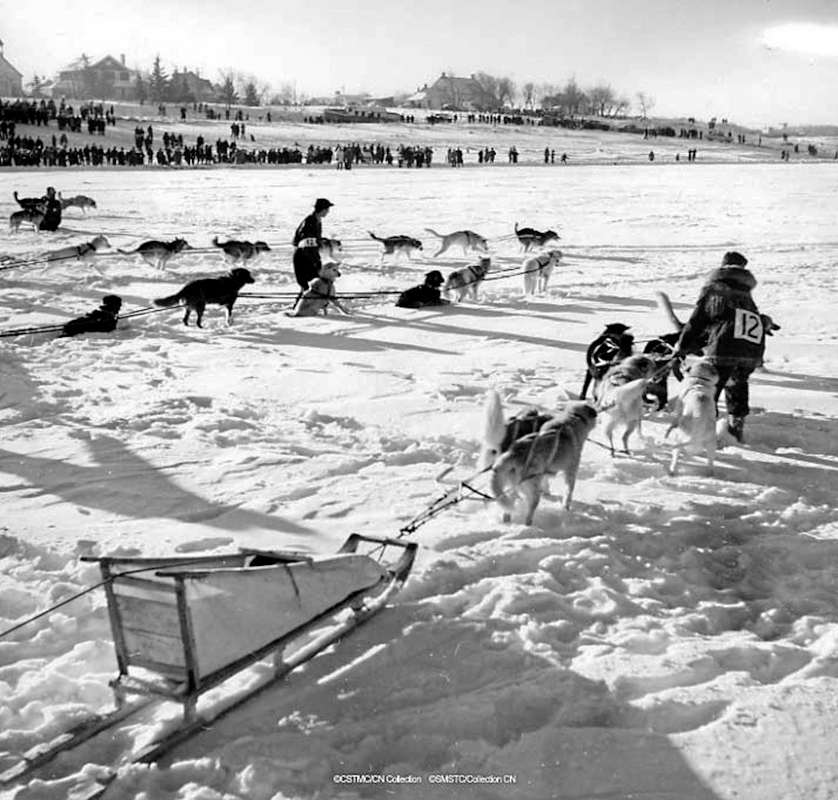Ah, the dog days of … the Trappers’ Festival
Advertisement
Hey there, time traveller!
This article was published 08/02/2021 (1725 days ago), so information in it may no longer be current.
This year’s Northern Manitoba Trappers’ Festival in The Pas, which is slated to run Feb. 17 to 21, is going to be a virtual event.
Festival organizers said the events include sasquatch calling, snow flea and ice worm creation, bannock baking, and a family talent show. Missing will be the yelping and anxiety of the sled dogs awaiting the start of the dog derby that has been a highlight of the northern celebration since 1948.
The 1948 festival booklet shows that the initial dog race was a 20-mile freight race with a team of not more than five dogs pulling a weight of 150 pounds. The course ran for 10 miles down the Saskatchewan River and then 10 miles back to the starting point. The first winner was conservation officer Jack Heard, who won $100 and a silver cup.

A 10-mile race with any number of dogs and junior dog and ski races also were part of the program.
In 1949, the major race ran over two days and was titled the Canadian Open Championship Dog Race. Any number of dogs could be used, but the musher had to complete the course with all his dogs. Injured dogs would have to ride in the sleigh.
The teams began on the Saskatchewan River in -25 F (-31 C) weather and on the first day mushed 70 miles north to Cranberry Portage. When they returned to The Pas the next day, Edwin Lambert from Pine Bluff was the winner of the $1,000 first prize and the Hudson Bay Mining & Smelting Silver Cup.
In 1953, festival officials decided to expand the race to a gruelling 200 miles over four days by adding laps from Cranberry Portage to Flin Flon and return on days two and three. An estimated crowd of 3,000 on the banks of the Saskatchewan watched 1952 champion Steve Pranteau, a 38-year-old Grand Rapids fisherman, beat 17 teams and finish in 19 hours, 31 minutes and 12 seconds. Gilbert Lavallee of Pine Bluff was second and 16-year-old Colin McKay from Grand Rapids was third.
Art Allen, a student at The Pas Collegiate Institute, mushed his team to fourth place and the start of an excellent racing career.
A few years later, at age 22, Allen accepted an offer from a businessman in Cedar Rapids, Iowa, to race his sled dogs and promote his highway equipment business. That led to him living in Iowa and competing on the sled dog racing circuit in New England and northern U.S. as well as Canada for 35 years. He did return to his hometown to race and captured the first of four Canadian Open championships in 1958.
In the 1970s, Art and his wife Judy won shorter races at the 1974 Festival du Voyageur in St. Boniface and he took three consecutive Trappers’ Festival dog derbies in 1976, 1977 and 1978.
The course had been shortened to 105 miles run over three days and after the 1977 race, northern
Manitoba mushers wanted organizers to switch the race back to a longer distance. They said their dogs were trained to work on trap lines and were bred for stamina and toughness while the American teams that were dominating focused on speed.
One American racer reminded them that the visitors were taught how to run dogs by northern Manitobans such as Allen and, earlier, Emile St. Godard from The Pas and Shorty Russick of Flin Flon, who were first and third in dog sled racing at the 1932 Olympics in Lake Placid, N.Y.
In addition to being one of the first full-time professional dog mushers, Allen bred and trained dogs for many years.
In 1984, he and Judy were in Winnipeg at the Fort Garry Hotel to lecture on sled dogs and their breeding.
Allen died in Cedar Rapids in 2011. On the Sled Dog Central website he was called “a legend” and recognized for his impact on the sport.
Memories of Sport appears every second week in the Canstar Community News weeklies. Kent Morgan can be contacted at 204-489-6641 or email: sportsmemories@canstarnews.com

T. Kent Morgan
Memories of Sport
Memories of Sport appears every second week in the Canstar Community News weeklies. Kent Morgan can be contacted at 204-489-6641 or email: sportsmemories@canstarnews.com
Our newsroom depends on a growing audience of readers to power our journalism. If you are not a paid reader, please consider becoming a subscriber.
Our newsroom depends on its audience of readers to power our journalism. Thank you for your support.




